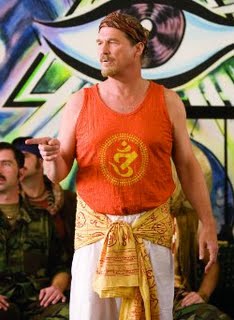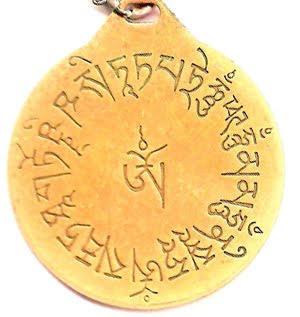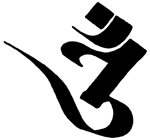I upgraded the oṃ page.
I don't whether to be pleased that my calligraphy and other methods have improved, or horrified at how poor some of my earlier work was. Hopefully the whole site will gradually be brought up to a higher level.
13 November 2009
Tadyathā in the Heart Sūtra

tadyathā
http://jayarava.blogspot.com/2009/10/tadyatha-in-heart-sutra.html
12 November 2009
Men who stare at calligraphy
 In the movie The Men Who Stare at Goats Jeff Bridges character is twice seen wearing a singlet with a large Siddhaṃ oṃ on it - see left.
In the movie The Men Who Stare at Goats Jeff Bridges character is twice seen wearing a singlet with a large Siddhaṃ oṃ on it - see left.See also my version of oṃ on Flickr.
Labels:
Siddham
08 November 2009
Mystery Amulet
 Nigel sent in this image of his amulet and asked about the mantra on it. The mantra is in the Tibetan Uchen (dbu-can) script. In the centre is the seed-syllable (bījākṣara) oṃ. The mantra starts at 6 c'clock and goes clockwise. It reads
Nigel sent in this image of his amulet and asked about the mantra on it. The mantra is in the Tibetan Uchen (dbu-can) script. In the centre is the seed-syllable (bījākṣara) oṃ. The mantra starts at 6 c'clock and goes clockwise. It readsoṃ sarvatathāgatoṣṇīṣasitātapatre hūṃ phaṭ hūṃ mama hūṃ ni svāhāIf we break the sandhi and add dashes for compounds it reads:
oṃ sarva-tathāgataḥ
uṣṇīṣa-sita-ātapatre hūṃ phaṭ hūṃ mama hūṃ ni svāhā
So now it becomes clear that this is a mantra for Uṣṇīṣa-sitātapatra (also spelt Uṣṇīṣa-sitātapattra) a Tantric goddess with 1000 heads, 1000 arms, and 1000 legs! Her name means something like 'crowned with a white parasol'. Her iconography is very complex, though apart from her multiple limbs she does carry a white (sita) umbrella/parasol (ātapatra) or sometimes a Tibetan victory banner. Robert Thurman tells us that she is a special form of Tārā and a counter part to the 100o armed form of Avalokiteśvara (The Sacred Art of Tibet p.319-321).
Here's the mantra written out in dbu-can.

Try here for an image of Uṣṇīṣa-sitātapatra.
Nigel made a generous donation for receiving this information - thanks again!
Labels:
Queries
07 November 2009
YouTube
Just found a new cache of Siddhaṃ calligraphy on YouTube (thanks to Riccardo's Facebook page Bonji 梵字 - Riccardo is a bit naughty and has been taking images from here without asking, but I'm sure we can sort something out). These are quite interesting examples which from the accompanying text and commentary are from Japan.
The Fudō Bīja hāmmāṃ
The Mahāvairocana Seed Syllable vāṃḥ
Note here that the calligrapher makes an error. He writes ba instead of va. The two are very similar. In ba the curve curls back to meet the stem on the up-stroke, whereas on the va it continues down to the stem on the down-stroke. These letters are similar in most Indic scripts: cf Devanāgarī ब व. Indeed they are often confused in pronunciation as well.
The Fudō Bīja hāmmāṃ
The Mahāvairocana Seed Syllable vāṃḥ
Note here that the calligrapher makes an error. He writes ba instead of va. The two are very similar. In ba the curve curls back to meet the stem on the up-stroke, whereas on the va it continues down to the stem on the down-stroke. These letters are similar in most Indic scripts: cf Devanāgarī ब व. Indeed they are often confused in pronunciation as well.
Labels:
Calligraphy,
Siddham,
YouTube
03 November 2009
Arapacana Monogram
I was asked about doing a Kalacakra style monogram by someone and so have been playing around. Arapacana seemed the obvious choice to do. Seeing all those tails hanging down it seemed like a good idea to braid them.
I quite like the result and may do more - though it's quite painstaking getting it to fit.
I quite like the result and may do more - though it's quite painstaking getting it to fit.
Subscribe to:
Comments (Atom)


